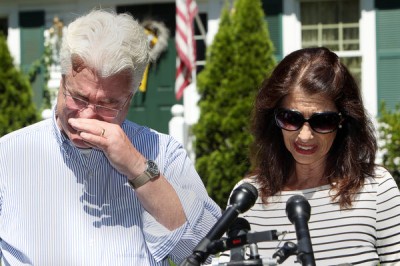
Before Islamic extremists brutally beheaded an American journalist on camera, they demanded $132 million in ransom from his family and his employer.
Islamic State (ISIS) terrorists began sending the serious messages to James Foley’s family and the GlobalPost last fall, Philip Balboni, the news agency’s head, told the Wall Street Journal.
At first, the infrequent messages made political and financial demands. Then, last week, the fighters sent a hateful email saying Foley would be killed.
“The message was vitriolic and filled with rage against the United States. It was deadly serious,” Balboni told CNN. Foley freelanced for GlobalPost, a Boston-based international news agency, before he was kidnapped in Syria in 2012.
Attorney General Eric Holder spoke out against the demanding terrorists in a Thursday press conference.
“This nation, we have long memories and our reach is very wide. We will not forget, and people will be held accountable,” he said.
He added that Foley was a “ ‘symbol of what’s right about the United States.’
‘The same ISIS terrorists who pressed Foley’s family for funds demanded at least $100 million from the United States government in exchange for the journalist’s release, the New York Times reported.
It’s unclear whether the requested $132 million from the family or the $100 million from the U.S. would have satisfied the terrorists’ demands.
Sticking to its longstanding policy of refusing to negotiate with terrorists, the U.S. declined to funnel the funds.
Some European countries have spent millions rescuing their citizens from terrorists’ hands. Over the past five years, terrorist groups in the Middle East have raked in about $125 million in the kidnapping plots.
Four French and three Spanish captives were released this year from Al Qaeda-like groups after the two nations transferred the money. The U.S. and Britain have refused to fund such terrorists groups, even when its citizens are on the line.
The refused ransoms were not the missed — or failed — opportunity to save Foley.

But when the troops reached their destination, the fighters and their detainees were nowhere in sight.
On top of the U.S. government’s efforts, GlobalPost worked tirelessly to bring its journalist home.
The organization worked with a security firm to find its missing freelancer, but that hunt — which cost the news agency millions of dollars — was ultimately unsuccessful.
The agency never paid the 100 million Euros, about $132 million, the terrorist demanded via email.
Foley went missing in northern Syria in November 2012. He was held with other ISIS-held hostages during his two years in captivity.
French freelance reporter Nicolas Henin spent seven months detained alongside the American photographer. When the terrorists though Foley was planning to escape, they inflicted a “brutal punishment” on him, Henin told ABC News.
Henin declined to detail the punishments, citing respect for Foley’s family.
ISIS released video of Foley’s execution Tuesday, although it’s unclear exactly when he was killed.
In the video, a masked fighter first explained Foley’s execution was a punishment on the U.S. for its recent airstrike campaign against ISIS, as the 40-year-old journalist kneeled in the sand beside him.
The group also warned that a second captive American journalist, Steven J. Sotloff, would be condemned next if the U.S. does not meet the terrorists demands.
“The life of this American citizen, Obama, depends on your next decision,” the terrorist said.
Sotloff, a freelance reporter for TIME magazine, was kidnapped in August 2013 while on assignment in Syria.


Leave a Reply
You must be logged in to post a comment.